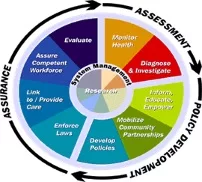Public Health General Education Concentration (GEC)
The Public Health general education concentration explores public and community health from interdisciplinary perspectives, looking at such issues as medical practice; public policy concerning health care; sociology of race, class, and gender; and cultural constructions of health and sickness. It aims to expose students to public health issues at global, national, and local levels. Students have the option of completing a significant co-curricular community-engaged project in lieu of one of the four GEC courses.
The option to include a co-curricular component as part of the public health GEC is designed to give students an opportunity to do experiential public health work outside of the classroom context. The co-curricular option is NOT required. The guidelines outlined below are designed to ensure the student is in fact doing a public health project, interacting with a community in an appropriate and ethical way, spending sufficient time on the project to truly become immersed in it, and thinking about how the project connects to what they have learned in their academic work. We offer this option to students with the hope that these opportunities encourage students to think about an entire subject in a new way—to open their eyes to new questions, to gain an appreciation of greater complexity—than what other academic work sometimes facilitates.
One co-curricular component may be applied toward this concentration with prior approval if the experience meets the following guidelines.
- The project relates to public health.
- The student has already taken two courses in the public health GEC.
- The student submits a proposal that explains how what he or she will be doing relates to public health. The proposal should articulate how the project relates to courses in the public health GEC that the student has already taken. It should also explain which of the 10 essential services of public health work the project addresses. (See description of these services below).The proposal should be thoroughly referenced to indicate that the student understands the larger public health context in which the work is situated. The proposal must be approved by the GEC coordinator before the student begins the project. No retroactive requests for credit for co-curricular activities will be considered. See #4 below for additional information.
- The student submits a completed Co-Curricular Community-Engaged Project Plan form to the Harward Center director, with a copy to the GEC coordinator, before the project begins. This form must include the signature of the proposed community partner, indicating his or her willingness to oversee the student’s on- site work and certify the number of hours worked.
- The work engages with a partner or group in an ethical manner consistent with community engagement effective practices of full partnership and mutual respect. Students must be qualified to offer any health services they render. Qualifications required for work in the U.S. must be met even if the student is working in another country. A brief orientation to community-engaged work, conducted by Harward Center staff, must be completed.
- The student spends a minimum of 30 hours working in a sustained manner on the project, not inclusive of time spent writing the proposal, literature review, or final reflection paper. Hours worked and tasks completed should be documented on a weekly basis using a web-based reporting system managed by the Harward Center.
- Upon completion of the community-engaged work, the student submits a Co- Curricular Community Engagement Completion Form to the Harward Center director, with a copy to the GEC coordinator.
- The student also ensures that the community partner completes the Community Partner Feedback Form.
- The student submits to the GEC coordinator an annotated bibliography that includes a brief summary and evaluation of 5-10 references from peer-reviewed literature or from government sources. Students should write 2-3 paragraphs per article.
- Every three weeks the student submits to the GEC coordinator a 1-2 page interim report in which he or she reflects in a critical way on what he or she is doing and learning.
Submissions to the GEC coordinator may be done electronically as PDF files (only) attached to an email. The current GEC coordinator is Heidi Taylor (htaylor3@bates.edu).
The 10 Essential Public Health Services (Adapted from the CDC website, 2015)

The 10 Essential Public Health Services describe the public health activities that all communities should undertake.
Public health systems should:
- Monitor health status to identify and solve community health problems.
- Diagnose and investigate health problems and health hazards in the community.
- Inform, educate, and empower people about health issues.
- Mobilize community partnerships and action to identify and solve health problems.
- Develop policies and plans that support individual and community health efforts.
- Enforce laws and regulations that protect health and ensure safety.
- Link people to needed personal health services and assure the provision of health care when otherwise unavailable.
- Assure competent public and personal health care workforce.
- Evaluate effectiveness, accessibility, and quality of personal and population-based health services.
- Research for new insights and innovative solutions to health problems.